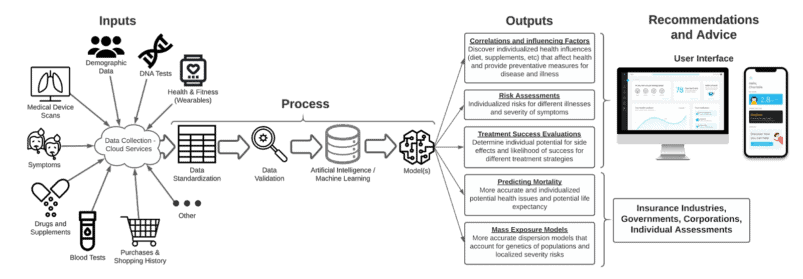
General Genomics is a bioinformatics artificial intelligence platform that provides customers with a comprehensive analysis of disease susceptibility and treatment effectiveness. In this interview, co-founders AJ Rosenthal and Warren Gieck discuss the importance of medical data ownership and its anticipated impact on personalized and preventative healthcare.
Please describe the story behind the company: What sparked the idea, and how has it evolved so far?
AJ: We started General Genomics right as the pandemic kicked off, around March of 2020. Schools were shut down, so I had my son with me, and he was asking some questions about Coronavirus and whether or not we would get sick or die. He was clearly upset and frightened, so I promised I would figure it out and called Warren, my old colleague from General Electric.
At the time, Warren was working in the artificial intelligence sphere at the center of innovation in Calgary, Alberta, where we first met. I called him up and told him about my idea, which seemed crazy at the time, to apply machine learning algorithms and put them into something that would solve the world’s problems. Surprisingly, we came to realize that no one has done it before. We had a scratch-your-head moment, and the next thing we knew it, we were getting these patents registered and starting our journey as a company.
Warren: AJ and I have known each other for quite a few years. We used to work at General Electric together. I led artificial intelligence and machine learning projects across different industries and verticals, including aviation, oil and gas, and healthcare.
In aviation, they process a terabyte of data every time a plane comes off the ground. We are used to processing vast amounts of data. We were able to work through DNA and medical datasets with surprising ease.
AJ: We are thought disruptors and innovators. We’re bringing ideas to market that nobody’s ever done before. Many people in the healthcare industry thought it was an impossible task because we weren’t directly from the healthcare industry. That actually gave us an advantage, both in terms of experience and know-how and in implementing solutions in a highly regulated industry that is swarmed with lobbyists and intermediaries with conflicting interests.
Because we come from an outside industry and expertise, our perspective is generally more holistic. We want a better place for our children and grandchildren to grow up in. That’s what General Genomics is all about.
What is the role of AI in healthcare?
Warren: Currently, the healthcare industry does not utilize even a fraction of their data. When you do a study, you’re intentionally only looking at one or two variables. For example, clinical studies will have a control group taking a placebo and a treatment group taking the actual drug. Even if you have thousands of participants, you’re not getting an accurate indication of why some people have side effects and don’t. The drug companies warn us that these side effects may occur, but there’s no correlation to why they would occur and who should be avoiding them. That’s essentially the challenge that we’re pursuing.
There’s a lot of data available now between genetics, wearable devices, and health analytics. People record so much data about their health and wellness. Somewhere in that data are the answers to those questions.
COVID is an excellent example where some people have severe or long-term reactions, while others show no symptoms at all. The potential correlations could be medications and supplements, or they could be age, race, and sex. When you bring machine learning into outlying areas of health care, such as mapping the genome, you begin to reveal the complex multi-dimensional relationships that determine one’s susceptibility to diseases and the effectiveness of treatments on their body.
All of those factors are important, but when you’re just looking at one or two variables, you only get a tiny piece of the potential correlation. For example, I have high blood pressure. Doctors call it Primary Hypertension, which means they have no idea what’s causing it. They’ve tried all sorts of drugs, and some of them actually increased my blood pressure, and they still don’t know why I have it.
The answer is somewhere in the data. It may be that we’re not collecting the right data at this point; maybe it’s not about genetics and is more to do with lifestyle. As we add more and more data, we’re able to get a clearer understanding and hopefully provide better treatments to individuals.
I think data needs to play a bigger role in healthcare, and we even hear that from doctors. We are working with a very influential Doctor who specializes in head trauma. One of his biggest concerns right now is the opioid crisis.
When a doctor like him has to prescribe painkillers, because their patient had a major accident, they don’t usually know which drugs would work best for that specific patient. They start with one drug, and if it doesn’t work, they try the next one, and the next one, and so on. During this trial and error, the prescribing doctor just hopes that it doesn’t harm them or get them addicted. Thankfully, we’re starting to see an increased use of data across the industry, and General Genomics is certainly at the forefront of that.
AJ: We have two registered patents that we filed in April of 2020. One is around susceptibility to disease and the other is about survivability from both disease and treatments.
Our susceptibility algorithm applies to all living organisms on the planet, humans and animals alike. That rolls into swine flu, avian flu, hoof and mouth disease, cattle string, etc.
Our second patent uses genetic data and predictive analytics to determine the degree of survivability with different treatment strategies.
We recently gave a talk to a group of doctors. They understood how artificial intellegence and machine learning would help them diagnose and prescribe medication, but they couldn’t understand the mechanism because the way they are taught in school is a lot more qualitative than quantitative. It’s a yes/no mechanism. Did the treatment work or not? Were there side effects or not?
When you start mapping it out genetically and environmentally, person by person, you see that even though we’re all made of the same building blocks, each one of us is unique. Therefore it makes sense that certain treatments will work for us and others won’t.
But General Genomics isn’t just about diseases. We know that people who live in certain environments are exposed to environmental contaminants. People who live by a power plant or large electrical wires might be faced with increased electromagnetic radiation. Over time, their body may become susceptible to it.
All those correlating factors produce predictive models. Our engineer-style approach to medicine breaks down the body into parts, just like an electromechanical system. If your heart is a pump and the synapses in your nervous system is the electrical system, your body is essentially a biomechanical system. With the right data, we can optimize our health at much greater efficiency than ever before.

What do you think is required to make personalized health data more available to the general public?
As data becomes more and more available, doctors, like engineers, are searching for more scientific approaches that are backed by confirmed scientific data so they have better confidence in the treatment plans they offer to patients. This is where solutions like ours come into play. We’re certainly seeing that as we enable more of these tools, doctors themselves also change some of their strategies.
One of our driving forces is to give individuals the ability to control their own health and medical information. Right now, you typically don’t get to see your test results. If you do keep a copy of them, you might see a summary sheet, but you won’t get a copy of the raw data. That is your data!
You might be moving between states, provinces, and countries, or you might want to give your data to children, a research institute, or a different medical practice. Those are all examples highlighting the necessity to transfer medical data.
Since it’s your personal data, we believe you should be in control of it, but typically, only another doctor or physician can get the data. A lot of dentists nowadays are looking for things like your latest blood panels, scans, or information, but they don’t have access to those medical systems so they have to request it through the patient.
Individuals need to take more responsibility and ownership of their health and health data. Our database is fully anonymized, so even if somebody were to break the encryption levels, they wouldn’t be able to connect the person and the data. With that kind of security control, people could have exclusive access to their data and decide who they want to share it with.
How do you envision the future of healthcare?
Warren: I think the future of healthcare lies in solutions that will help both doctors and patients get a more comprehensive picture of potential side effects in response to a treatment or an illness, so they can make better, more informed health decisions.
Personalized medicine and telemedicine are becoming increasingly prevalent. Making that knowledge more available to professionals and individual patients is where healthcare needs to go.
Most people aren’t aware that healthcare is the number one expense in almost any government’s budget, outweighing education, military, and social welfare. Optimizing our health care system to be more efficient with data could greatly impact our economies. It’s not just about the health of individuals, but about public health as a whole, both physical and mental.
We are seeing more holistic approaches with a lot of practices in Canada and the US. More and more clinics are starting to have a variety of medical and health resources. Certainly, alternative medicines and healers are gaining recognition and more and more people are using them, searching for more personalized and preventative medicine.
Functional medicine has increased dramatically. Supplements, vitamins, and preventative diets have been trending. For example, during the pandemic, there has been a lot of information on the importance of zinc, vitamin D, and other preventative supplements. Doctors are certainly not ignoring it, but change takes time. I think it’s going to trend more and more that way but it’s really up to the individual to take control of their own health and wellness. It’s to do with the patient choosing their own path or helping to educate their doctors
Of course, there are certain areas where hospitals and doctors don’t necessarily need personalization, like trauma, broken bones, accidents, or heart attacks. So I think the change has to happen at the family practitioner level.
I look at the pandemic and the decisions that go back and forth every day. They have just as many doctors on one side as they do on the other; they cannot reach a consensus, and the discussions around it have become almost political. From our perspective, if you remove the interpretations out of the equation, you’ve already done a lot. At General Genomics, we take an agnostic, engineerial approach. We’re not here to choose sides. We just want to provide doctors with better tools so they can utilize data more effectively. Solutions like ours help reveal that nothing is absolute, and that nature is wild and far more complex than we think. Using AI, we can create the tools for a new type of medicine that is far more accurate than we ever imagined.

